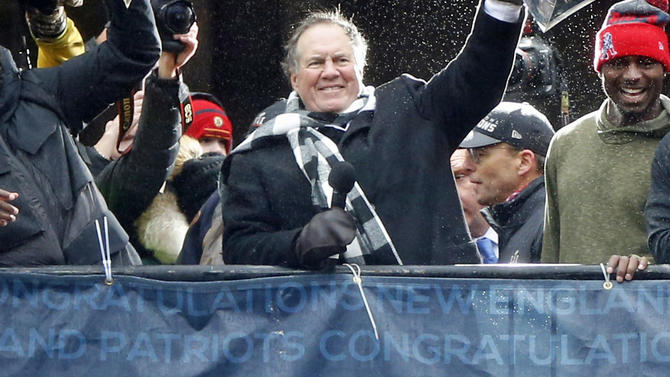In the NFL, as players, coaches, executives, fans and those within the media, we're brainwashed into thinking more is always more, and bigger is always better.
The team that works the hardest will prosper. The coaches that stay in the office the longest, and sleep the least, are the best and hardest-working. The owners who spend the most money are the most committed, and therefore will win. Whoever makes the boldest and flashiest signings in the first week of free agency has had the best offseason and set themselves up for success.
Greed is good. Gluttony is probably better. Being economical in thought, effort or in delivery isn't much of a consideration. We don't hear too much about that. Heck, even the teams that manage to have the most cap space available tend to get fawned over a bit in February and March, as if any franchise with $60 million in cap space could actually fill it all in three offseasons, let alone one. The team holding the most draft selections every April gets oohs and aahs and is the envy of all for that weekend, though far less is made of how many of those coveted picks actually turn into young men who can play professional football at an above-middling level.
The idea that, in many walks of life, less can be more, is tantamount to treason in the NFL. It's not very sexy or gaudy. It doesn't attract attention the way signing someone to a record contract for his position group does. It's not as cool to note in a feature story the way that we so often tend to find out which coach is routinely the last to turn off his lights in the office in his respective facility -- so surely he should be the next in line for a promotion (never mind if he's playing solitaire on his computer or watching old cartoons instead of actually falling asleep to game film; we'll never be the wiser).
It's endemic to the culture of the NFL. Just work, work, work. That'll solve everything. It's not so much about working smartest or maximizing time management. Just be at the facility for 20 hours a day and everything will come together soon enough. Not winning games? Hire two more replay assistants and someone else to handle timeouts and get a red-zone passing coordinator and a few more quality control guys and five more kids to run water to the players at practice. Add five more Harvard grads to the analytics department.
Throw more money at the problem. Throw more people at the people. More, more, more!
And yet, despite a system that, in totality, is the ultimate corporate welfare for billionaires -- with the draft, the schedule, the salary cap and revenue sharing in essence socializing the economics of the league and, in theory, creating a confederacy of parity -- we get seemingly the same teams deep in the playoffs year after year. Go back to 1997 (a span of 20 years and 21 Super Bowls), and it's quite frequently New England or Pittsburgh or Baltimore or Green Bay or Denver or the Giants hoisting the Lombardi at the end. Yeah, we get a handful of new teams in the postseason each season, but when you look at the Super Bowl itself, 11 teams account for the last 21 champions and six teams alone have taken up 16 parades in a 21-year span.
And the New England Patriots alone have accounted for five titles and three runners-up since 1997. They are a true dynasty -- one that seems far from its last legs -- and they have done it throughout the NFL's free agency era.

So, where am I going with all of this?
Well, I'd urge you to check out lacrosse star and entrepreneur Paul Rabil's "Suiting Up" podcast for his latest episode with Bill Belichick, the very architect of the Patriots' Lombardi Trophy monster. For Belichick, he's more focused on finding the very best and brightest -- those who he can trust deeply and who fit his culture -- and empowering them in unique ways. Of course, the fact that he could coach pretty much every position group himself and he could personally install the offense, defense or special teams helps. And having arguably the greatest coach ever running things, along with the greatest quarterback ever, certainly gives New England a head start each season, but I believe there is plenty that others in his profession (or any walk of life for that matter) could learn about Belichick's belief in at least a relatively streamlined approach to his staff in a time of excess.
"My philosophy, really, is that less is more, so I'd rather have fewer people doing more work than more people doing a little more work," Belichick said in the podcast interview. "As long as everybody is busy, as long as everybody feels productive, they feel good about what they're doing and they feel like they're contributing; I think when people have lag time and kind of not enough to do, that leads to getting distracted and complaining or being less productive. So even though you have more people, sometimes less work gets done."
The fact that he's been able to keep trusted assistants like Josh McDaniels, Nick Caserio and Matt Patricia around as long as he has is staggering -- and winning so much has an inherent allure which makes highly-qualified people want to hang around well after they could leave for a bigger job elsewhere. Trust me, it's not like Belichick is running a kindergarten and guys are sipping juice boxes and reading comic strips all day. He demands a lot and expects a lot, but he isn't falling prey to multiplicity in his approach or getting caught up in keeping up with the Joneses in the coaching or personnel department where titles are thrown around all over the place.
"From a getting-everybody-on-the-same-page standpoint, which is critical," Belichick said, "the fewer people you have to manage, the easier it is to get everybody on the same page. So, if you're talking to 10 people, it's hard to get all 10 people doing the same thing or doing the right thing. Now you make that number 20, instead of 10, it's even more difficult. If you have five people supervising another 15 people, now you have another layer there where you're not dealing directly with everybody, and now you're somewhat dependent on other people to relay the message the way you want it done and to monitor it that way … As much of that that I can eliminate, I think works better for me."
Bill Walsh's 1994 San Francisco 49ers coaching staff had a total of 14 coaches, including special teams and all positions. The 2017 Cleveland Browns currently employ 19, including three for special teams alone, and some staffs are over 20 men deep. Sure, the game has grown and evolved since then, but come on -- do you think they really need 120 percent of the coaching staff to teach football?
If I owned an NFL team, I'd mandate that everyone goes home from 5:30-7 p.m. every night to actually reconnect with the families and have some semblance of balance in their lives. If guys want to return for a few hours after that, great, but it wouldn't be mandatory. I'd champion making the most of the hours between practices rather than fetishizing all-night planning meetings.
Because the way most of the league is doing things isn't really working for them, and the guy who wins more than everyone else might know a thing or two about what he's talking about. You can be productive without crippling your home life. You should be able to be a coach and a father at the same time, and not just for a few weeks each spring between OTAs and training camp.
Less can be more. Bigger ain't always better.


















